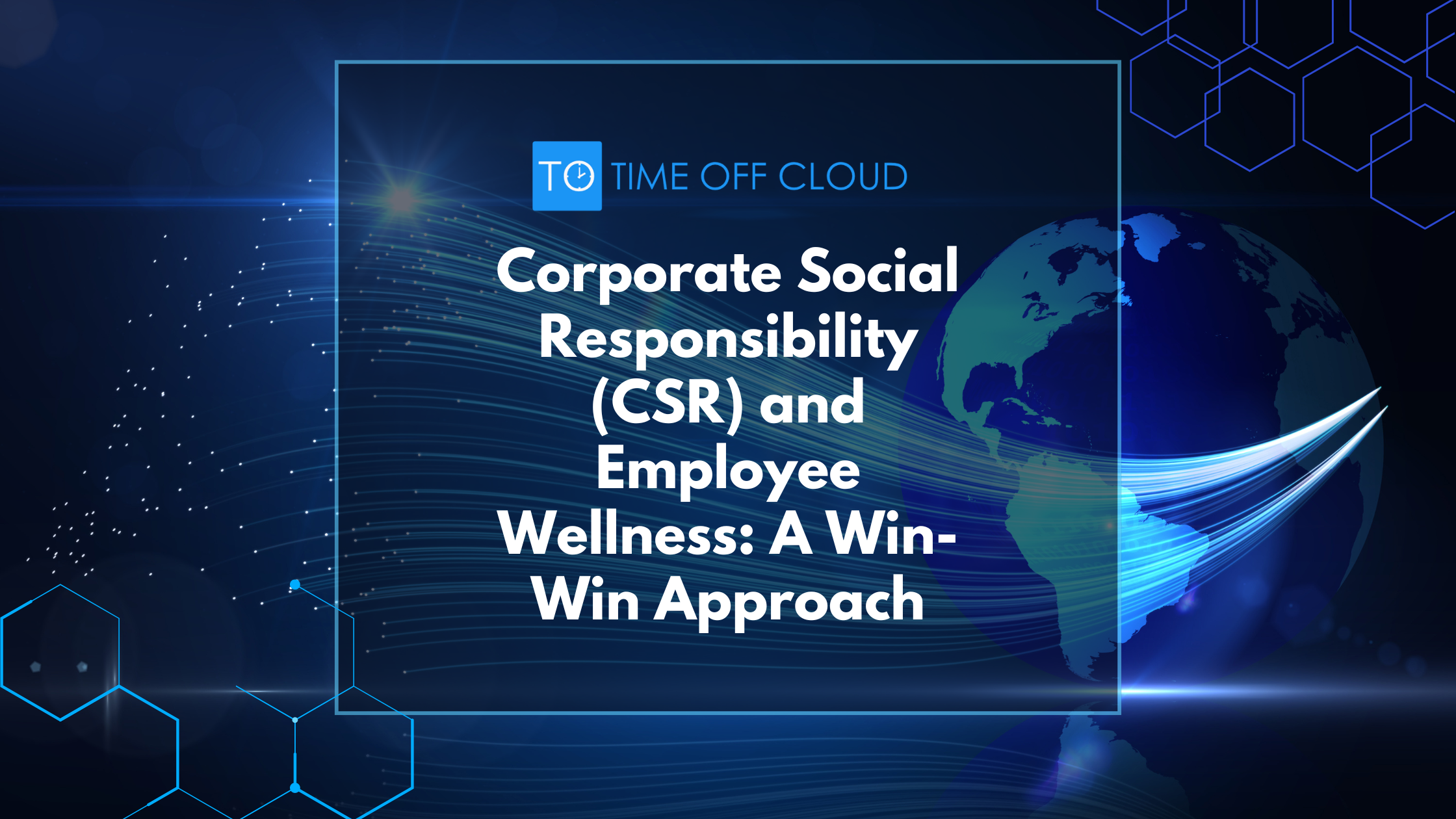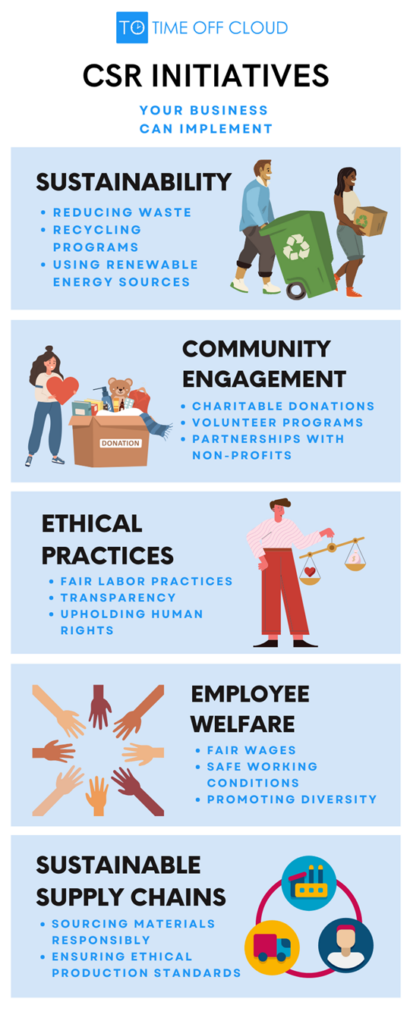Corporate social responsibility (CSR) is an important aspect of modern business strategy. It involves companies taking responsibility for their impact on society and the environment, going beyond compliance with legal requirements to actively contribute to social and environmental well-being. By integrating CSR into their operations, businesses can enhance their reputation, build customer loyalty, and attract top talent. Learn more in this post from Time Off Cloud.
The Importance of Corporate Social Responsibility
What is CSR?
Corporate social responsibility refers to the practices and policies undertaken by businesses to manage their social, environmental, and economic impacts. Key components of CSR include:
- Ethical business practices
- Environmental sustainability
- Community engagement
- Employee welfare
- Sustainable supply chains
- Corporate governance
Examples of CSR Initiatives
CSR initiatives can take many forms, depending on the goals and values of the organization. These initiatives not only demonstrate a company’s commitment to social responsibility but also contribute to its long-term success by building trust and goodwill among stakeholders. Here are some examples of CSR initiatives that businesses can implement:
- Environmental Sustainability: Organizations can implement eco-friendly practices such as reducing waste, recycling, and using renewable energy sources.
- Community Engagement: Supporting local communities through charitable donations, volunteer programs, and partnerships with non-profit organizations.
- Ethical Business Practices: Companies should enforce fair labor practices, maintain transparency and uphold human rights standards.
- Employee Welfare: Provide fair wages, ensure safe working conditions, and promote diversity and inclusion.
- Sustainable Supply Chains: Ensuring raw materials are sourced from suppliers who follow sustainable practices and ethical standards and partnering with suppliers that adhere to fair labor practices.
Check out the infographic below on how you can implement CSR initiatives within your organization.
Benefits of CSR for Businesses
Implementing CSR initiatives offers numerous benefits for businesses, including:
Enhanced Brand Reputation
According to a recent study, 88% of respondents believe it is important for businesses to make the world a better place. Companies that are perceived as socially responsible often enjoy a better reputation among consumers, investors, and other stakeholders.
Increased Customer Loyalty
Consumers are more likely to support businesses that demonstrate a commitment to social and environmental causes. In the study by Gallup, 72% of respondents stated they would pay more for a product from a company that treats its employees well.
Attraction and Retention of Top Talent
Employees, especially younger generations, are increasingly looking for employers who share their values and are committed to making a positive impact. The Gallup study stated that 71% of young Americans say they’d switch jobs to work for an organization that has greater impact on the world.
Understanding Employee Wellness
What is Employee Wellness?
Employee wellness refers to the programs and initiatives implemented by employers to promote the physical, mental, and emotional health of their employees. This is built on the premise that healthy employees have a significant impact on the bottom line in many ways.
Types of Wellness Initiatives
Wellness initiatives can be tailored to address various aspects of an employee’s well-being. By offering a comprehensive range of wellness programs, businesses can support their employees’ physical, mental, and financial health. Here are some types of wellness initiatives:
- Physical Wellness: Fitness programs, health screenings, and ergonomic workplace designs.
- Mental Wellness: Access to counseling services, stress management programs, and mental health awareness campaigns.
- Financial Wellness: Financial planning workshops, retirement planning resources, and employee assistance programs.
- Work-Life Balance: Flexible working hours, remote work options, and paid parental leave policies.
- Emotional Wellness: Programs that foster a supportive work environment, such as peer support groups and resilience training.
The Synergy Between CSR and Employee Wellness
Creating a Positive Work Environment
Integrating CSR initiatives with employee wellness programs can create a positive work environment that fosters a sense of purpose and belonging among employees. This integration can lead to numerous benefits. Employees who participate in CSR activities often feel a greater sense of purpose and connection to their company, enhancing their overall job satisfaction. Additionally, CSR projects often require teamwork and collaboration, which can strengthen relationships among employees and encourage a more cohesive and supportive workplace culture.
Community Engagement and Employee Involvement
Encouraging employee participation in CSR activities can have a positive impact on both employees and the business. When employees are actively involved in CSR initiatives, they experience a heightened sense of engagement and pride in their work. It makes most people happy knowing that they are contributing to meaningful causes. This increased engagement can lead to higher job satisfaction, improved morale, and stronger loyalty to the company.
For the business, employee participation in CSR activities can enhance its reputation. It can also build stronger community relationships and demonstrate commitment to social responsibility. This symbiotic relationship between employee involvement and community engagement helps create a more positive organizational culture.
The Role of Time Off Management in CSR and Employee Wellness
Effective time off management is essential for supporting CSR and employee wellness programs. Properly managing employee time off ensures that employees can participate in wellness initiatives and CSR activities without disrupting business operations.
Facilitating Employee Participation in CSR Activities
Time off management tools can accommodate flexible scheduling. This allows employees to participate in volunteer and community engagement activities. This flexibility encourages more employees to get involved in CSR initiatives.
Automated Approvals
With automated approval processes, employees can quickly and easily request time off for CSR activities, ensuring that their participation is seamless and does not interfere with business operations.
Supporting Employee Wellness Programs
Time off management tools can track various types of leave, including:
- Wellness leave for medical appointments
- Vacation time
- Mental health days
- Personal time
- Parental leave
- Sabbaticals
- Bereavement leave
Consistent Policy Enforcement
Time off management software ensures that time off policies are consistently applied across the organization. This transparency and fairness boost employee trust and satisfaction.
Real-Time Visibility
Employees and managers can have real-time visibility into leave balances and time off schedules. This clarity helps in planning and prevents any confusion or disputes over leave entitlements.
In Conclusion
Integrating CSR with employee wellness programs offers numerous benefits for businesses, including enhanced reputation, increased customer loyalty, and attraction and retention of top talent. Time off management software plays a major role in achieving these goals. By adopting a comprehensive approach to CSR and employee wellness, businesses can create a positive work environment that benefits both employees and the organization overall.
Contact Time Off Cloud
For more information on how to integrate CSR with employee wellness programs or to book a free trial of our time off management software, please contact Time Off Cloud. We are here to help you create a balanced and productive work environment.



